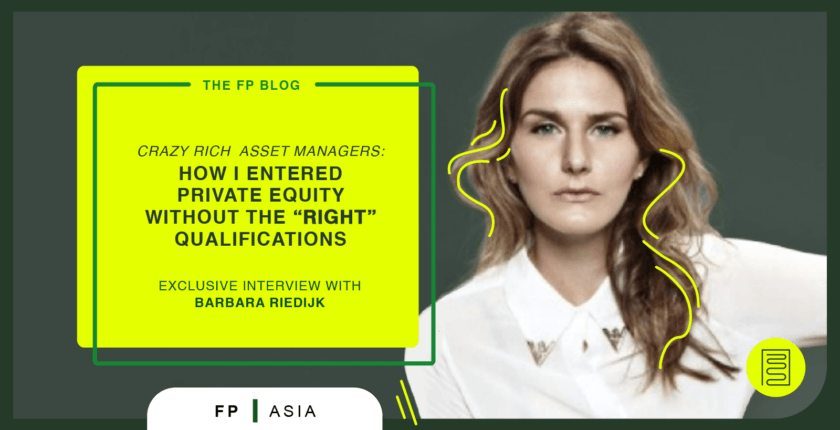Latest Insights
November 16, 2018
An exclusive interview with Barbara Riedijk, Director Business Development & Strategic Marketing at Hector Capital Partners. Find out how she navigated her way into the elusive world of buy-side finance through an unlikely and unusual route:
1. What was your journey like before joining Private Equity (PE)?
I grew up in the Netherlands, studied fashion in London. In a pivotal moment in 2011, I flew from UK to Singapore with just two luggage bags and no job. After immersing myself in some short-term business courses, I started my first business, VIP Experience.
It was a concierge business in December 2011, facilitating expat networking. That’s where I gained experience in both B2C and B2B marketing, Public Relations (PR) which led me to start Kala Club in 2013 – where we curated a range of events with unique concepts for the like-minded urban community.
Two years later in 2015, I opened a pop-up store at the local Winter Wonderland to sell Dutch pancakes. What started off as was a passion project started making a lot of money (more than $100k in the first year!) and it became a full-fledged business, All Things Dutch.
After five crazy years of venturing out on my own, I felt I needed a change – although I did not quite know what that would be. By then, I had amassed quite a network in Singapore and was well-acquainted with several industry leaders.
One day, as I was walking out of my office, someone approached me. His name was Vikash Kumar and his office was situated on the same floor. It turned out that he headed a PE firm, Hector Capital, which invested private companies in Southeast Asia, South Asia and USA specializing in consumer-related companies.
We struck up a conversation and he told me he was actively on the look-out for promising start-ups and was keen to invest in me “I’ve heard quite a bit about you and must say I’m pretty impressed with how quickly you grew both your businesses through your networking and growth-hacking capabilities”
But then he then surprised me with another proposition: “Actually, I think your entrepreneurial skills and connections would be a great asset to the PE industry. You’d be the perfect person to do business development for my firm – would you be up for the challenge?”
It didn’t take me very long to think it over, and that’s what kick-started my journey into private equity, with Vikash as my current boss.
2. What was your experience like entering the PE industry without any “technical” qualifications?
The first three months was super intensive – it was a crash course in understanding numbers, balance sheets, and term sheets. I had to learn on the job and honestly it was quite frustrating as I did not have the “traditional MBA school” foundation that many others did. Some people were rude, others tried to step all over me, but I realised that it was all part-and-parcel of the learning curve.
It did help that I had some basic background in numbers when running my own business – such as filing my own taxes, balancing P&L sheets, and doing some personal trading. Nevertheless, I had to be willing to ask for help – either online, or from contacts in the industry to fill in the gaps.
However, I’d say what really made my boss want to hire me was my personal connections and also an injection of creativity, which was sorely lacking in the PE industry. It required a lot more entrepreneurial and relationship-management skills, compared to investment banking or trading.
It’s not just about numbers but it’s also about public relations, connections, relationship-management and networking abilities.
Also, it’s vital to have good chemistry with your boss – someone who is patient and willing to mentor you, have your back, while still giving you autonomy. I’m really grateful to my boss for giving me that space to grow.
3. What advice would you give someone who doesn’t have any finance background? How can they prime themselves to enter this industry?
You still need the foundation – there is plenty of free information online to grasp the basics such as term sheets, excel skills, and valuation techniques. It’s also crucial to analyse case studies to train your business acumen.
But beyond that, I think it’s important to ask yourself: what can you bring to the table that someone else can’t? How can I value-add or represent the company in a way that no one else can?
Using my case as an example, what I brought in was my interpersonal skills in relationship management, along with extensive connections accumulated throughout the years. As a result,
I was bringing in deals – directly and indirectly – through leveraging contacts that they never had before. I would’ve never got these kinds of contacts if I had been in the finance space all along!
The foundation is important, but if you are willing to work hard, leverage your Unique Selling Point, and be wiling to learn, then it doesn’t mean you necessarily need a finance background.
4. How is the lifestyle and work-life balance in PE compared to previously when you had your own business?
When you’re running your own business, you don’t have any work-life balance!
I never had the desire to go to PE previously. To be honest, it’s because I really admired the person that I was going to work for. I took up the job more for mentorship opportunities nnd an opportunity to stretch my capabilities. It made me want to work harder to learn about the ins-and-outs of this industry.
Coming from an entrepreneur’s perspective, I knew that there was constantly a need to look for investors. However, I never knew what an investor really looked out for, and the real reasons why startups get funding or not. But it’s been really insightful discovering the other side of the coin and all the unspoken factors that are taken into consideration.
5. What tips do you have for someone who does not have any personal contacts in the industry and wants to apply traditionally?
It was fortunate that I had my own personal contact – but I know that might not be case for most people. A piece of advice – besides just sending in your CV like the rest of the world, they should showcase their creativity and determination in some way or another! I don’t care what it is – sending over a dongle, hand-writing something or delivering it to the office… just do anything that’s more exciting than just applying online!
When interviewing people for my own company, it is 50% of “do I actually like this person?” and the other 50% was “do I really believe this person has the passion to deliver?”
Another approach would be to get in touch with a recruitment consultant that is specialised in this space to assess your strengths and experiences and match you with a suitable role and company in the PE industry. I’ve had a great experience working with Funds Partnership Asia, a specialised recruitment boutique for the investment management industry.
It’s really about the survival of the fittest. If you really want it, you will get it.
6. What’s the most fulfilling thing about working in PE?
As cliché or superficial as it sounds, honestly: IT’S THE MONEY
It’s the thrill buying something at a low price and selling it at a higher price. You buy something that’s broken, you fix it and sell it.
It is incredibly inspiring when you’re investing into a company to save it, or increasing its revenue – you get a huge kick out of it.
Also, when you set up your own business, it’s your baby and you’ll be very protective about it. But when you start doing PE, you naturally become more objective and sharp in your business acumen- you see what works and what doesn’t.
7. What are your next steps?
I’m currently exploring setting up an office for Hector Capital in Dubai to oversee the Middle East and European office while working offshore from Europe.
Regardless, I will always stay connected in PE. If I ever need investments, now know a lot of good people in my network! It’s provided me invaluable experience, and I will definitely use these skills for the rest of my life.
8. Do you think this industry is for everyone?
This industry isn’t for those who want a typical cushy office job where they can go home at 6pm everyday.
Also, being a woman in a male-dominated industry, I’ve realised the importance of standing up for yourself – otherwise it’s very easy to get trampled on in such a cut-throat environment.You need to be confident of who you are and why you add value.
Everyday I constantly ask yourself: is what I want? And when you have that conviction, you will find all kinds of ways to make it work.
9. Who will you look out for when hiring now for your firm?
I would definitely look out for passion and determination – how much a person really wants it would determine their success and how long they can survive. For example, if they mention that they resent doing overtime work, I will never hire them. Private equity is not a short-term sprint – it’s sometimes a marathon.
You also have to be self-motivated and independent. I am happy to mentor, but I have no interest nor time to babysit someone who has no initiative.
Of course, they also need to have the basic skills – to be able to read graphs, do math and written. But more than that, if they are willing to be groomed, are teachable and are passionate, they will definitely stand out to me!
If you are interested to speak further with Barbara on investment advisory, industry trends, or if you are considering pursuing a career in this space (even if you do not have the “right” qualifications), do send your queries to ayyaz@fundspartnership.com and we will be in touch shortly!
Share This Article
Articles You May Like















